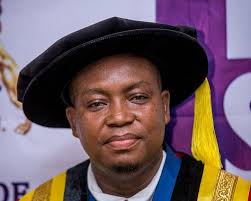The recent decision by the US Embassy to impose visa restrictions on individuals who may disrupt Ghana’s democratic process ahead of the upcoming December elections has received significant praise as a measure to promote peace, stability, and political accountability in Ghana. This policy, aimed at curbing political violence, sends a strong message that any attempt to undermine democracy could have serious personal consequences for those involved.
However, new information suggests that this policy may have roots in the work of a Ghanaian academic, Rev. Prof. Emmanuel Yao Nash. Between 2014 and 2016, Rev. Prof. Nash, a prominent peace advocate, conducted a comprehensive study on electoral violence and its prevention in Ghana. His research concluded with a recommendation that international embassies, including the US Embassy, halt the issuance of visas to politicians until elections were completed. He argued that denying politicians the ability to leave the country during election season would compel them to act with integrity and responsibility, knowing they were accountable to local laws and citizens.
Rev. Prof. Nash’s findings were widely publicised, including an article in Graphic Online in October 2016 titled, “Withhold Visas for Politicians Till Elections.” His appeal for embassies to adopt his approach to promote electoral decency stemmed from a foundation of academic rigor and peace advocacy.
Despite the depth of Rev. Prof. Nash’s research and his efforts to gain embassy support, this reporter has learned that the US Embassy did not acknowledge the professor's ideas or offer support. Furthermore, the embassy reportedly declined to attend the launch of the Ghana Peace Awards (GPA) in 2016, an event inspired by his research to honour individuals and organisations dedicated to promoting peace in Ghana.
Nevertheless, the US government now appears to have adopted Rev. Prof. Nash’s recommendation as its own. US Secretary of State Antony Blinken has since imposed similar visa restrictions in countries such as Sierra Leone, Bangladesh, and Liberia. These actions are framed as part of the US government's commitment to supporting fair elections worldwide, with visa restrictions serving as a deterrent to political actors who might undermine the democratic process.
While the implementation of Rev. Prof. Nash’s recommendations underscores their value, his contributions remain largely unrecognised. Formal acknowledgment from the US Embassy would not only honour Rev. Prof. Nash’s original work but also lend greater credibility to future research efforts aimed at fostering peace in Ghana, Africa, and beyond.
Latest Stories
-
NPA Fraud Case: Mustapha Hamid, co-accused granted GH¢2m bail each
4 minutes -
You have a responsibility to plan your retirement seriously – EDC’s Paul Mantey
8 minutes -
Lands Commission to decentralise services nationwide by year-end, says Minister
10 minutes -
Minerals Commission Act 85% complete in sweeping reform for equity and sustainability
19 minutes -
ICU-Ghana women’s wing holds 6th National Delegates’ Conference
20 minutes -
907 of 1,278 small-scale mining licences under review for revocation – Lands Minister
24 minutes -
Newly sworn-in MP for Ablekuma North, Ewurabena Aubynn appointed to serve on GSA Board
25 minutes -
55 small-scale mining licences revoked, 907 under review – Lands Minister
31 minutes -
John Dumelo donates 500 bags of rice to UG
31 minutes -
Forestry Commission reclaims all nine red-zoned forest reserves – Lands Minister
35 minutes -
Sarkodie hails ‘The Volta Regime’ by Edem as one of Ghana’s greatest albums
42 minutes -
1,200 excavators impounded at Tema port pending validation – Lands Minister
43 minutes -
Four Africans take part in FIFA Elite Performance Coach Mentorship Programme
47 minutes -
New $250 US Visa Integrity Fee undermines diplomatic fairness for Ghanaians
48 minutes -
US Olympic & Paralympic Committee bars transgender women from competing in women’s sports
53 minutes

